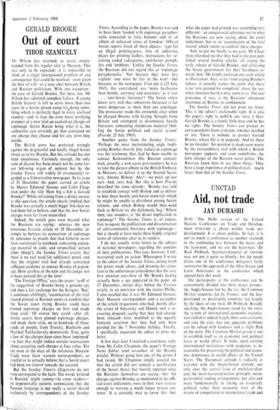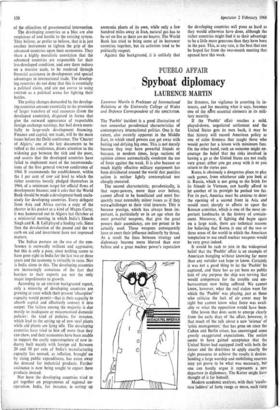Aid, not trade
UNCTAD JAY DUBASIII
Delhi—The Delhi session of the United Nations Conference on Trade and Develop- ment (UNCTAD) is about neither trade nor development. It is about politics. In fact, it is not so much a conference as another skirmish in the continuing war between the haves and the have-nots, and we are the have-nots.' Dr Ratil Prebisch, Secretary-General of UNCTAD, may not put it quite so bluntly; but the words (from one of his conference delegates) fairly summarise the approach of the Afro-Asians and Latin Americans to the conference which opened here this week.
The participants at the conference can be conveniently divided into three major groups: the Anglo-Saxons led by the us; the Common Market countries led by France; and the less- developed or developing countries led largely by the ideas of one man, Dr Prebisch. Broadly speaking, the Anglo-Saxons stand for the exist- ing system of international economic organisa- tion (which is indeed largely their own creation), and take the view that any apparent problems can be solved with kindness and a slight flick of the wrist. The Common Market group is out to establish itself as an economic and political force in world affairs. It looks upon existing international institutions with suspicion, as in- struments for preserving the political and econo- mic dominance in world affairs of the United States. The 'European' attitude is radically at variance with the Anglo-Saxon attitude, not only over the central issue of multilateralism and the most-favoured-nation principle versus preferential trading arrangements, but also and more fundamentally in taking an essentially political rather than economic view of the nature of competition in international trade and of the objectives of governmental intervention.
The developing countries as a bloc are also suspicious of and hostile to the existing system. They believe, or prefer to believe, that iis just another instrument to tighten the grip of the advanced countries upon their economies. They share a highly moralistic conviction that the advanced countries are responsible for their less-developed condition, and owe them redress on a massive scale, to be rendered through financial assistance in development and special advantages in international trade. The develop- ing countries do not deny that this is essentially a political claim, and are not averse to using mcrAn as a political arena for fighting their battles.
The policy changes demanded by the develop- ing countries amount essentially to the provision of larger transfers of real resources (from the developed countries), disguised in forms that give the outward appearance of respectable foreign exchange earnings, but boil down essen- tially to large-scale development financing. Finance and capital, not trade, will be the main issues before the Delhi conference. The 'Charter of Algiers,' one of the key documents to be tabled at the conference, draws attention to the widening gap between the rich and the poor, and asserts that the developed countries have failed to implement most of the recommenda- tions of the first general UNCTAD conference of 1964. It recommends the establishment, within the 1 per cent of GNP aid level to which the richer countries loosely pledged themselves in 1964, of a minimum target for official flows of development finance; and it asks that the World Bank should be made a development bank exclu- sively for developing countries. Every delegate from Asia and Africa carries a copy of the charter in his pocket as a kind of Magna Carta; it was hammered out in Algiers last October at a ministerial meeting in which India's Dinesh Singh and K. B. Lall played a leading role. Since then the devaluation of the pound and the us curb on aid and investment have not improved matters.
The Indian posture on the eve of the con- ference is outwardly militant and aggressive; but this is only a pose, since nothing seems to have gone right in India for the last two or three years and the economy is virtually in ruins. Nor is India alone in this. The developing countries are increasingly conscious of the fact that barriers to their exports are not the only major impediments to growth.
According to an UNCTAD background report, only a minority of developing countries are growing at rates which their present `absorptive' capacity would permit—that is their capacity to absorb capital and effectively convert it into output. The failure among the majority is due mostly to inadequate or misconceived domestic policies: the kind of policies, for instance, which lead to the setting up of new steel plants while old plants are lying idle. The developing countries have tried to bite off more than they can chew, and their economies have been unable to support the costly superstructure of new in- dustry built mainly with foreign aid. Between 20 and 50 per cent of India's manufacturing capacity lies unused, as inflation, brought' on by rising public expenditures, has eaten Moray the demand for industrial products. Further assistance is now being sought to export these products instead.
Nor have the developing countries tried to get together on programmes of regional co- operation. India, for instance, is setting' up ammonia plants of its own, while only a few hundred miles away in Iran, natural gas has to be set on fire as there are no buyers. The World Bank has tried to bring some of its borrower countries together, but its activities tend to be politically suspect.
Against this background, it is unlikely that the developing countries will press as hard as they would otherwise have done, although the richer countries might find it to their advantage to be a little more generous than they have been in the past. This, at any rate, is the best that can be hoped for from the two-month meeting that opened here this week.



































 Previous page
Previous page